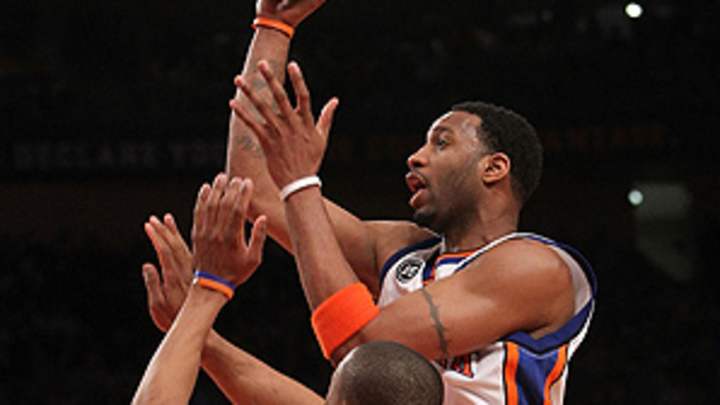This was the Tracy McGrady of old

There wasn't much not to like about McGrady's debut with the Knicks on Saturday night. Sure, he started slow. His night unofficially began with Wilson Chandler redirecting him to a different spot at center court for the opening tip. His first few dribbles looked sloppy and the look on his face showed the lack of confidence that comes with playing just 46 minutes in nearly a calendar year.
That feeling lasted, oh, about two and a half minutes.
Then McGrady drew a foul on a jump shot and swished two free throws.
He followed that up with bullet-pass assist to David Lee and picked up another on a handoff to Lee moments later. By the end of the first quarter McGrady had 10 points, three assists and the sellout crowd of 19,763 superstar-starved Knicks fans roaring in thunderous approval. He finished the game -- good one, by the way, won by Oklahoma City 121-118 in overtime -- with 26 points, five assists, four rebounds and the seal of approval from the Madison Square Garden crowd.
"It really gave [me] chills down my spine," said McGrady. "I haven't felt that good in awhile."
It's possible that McGrady's time in New York won't last longer than the 28 games the Knicks have remaining in the season. It's no secret that McGrady's true value lies not in his seven All-Star appearances and 21.9 career points-per-game scoring average, but in his $22.5 million expiring contract. The Knicks are expected to be among the biggest players in this summer's free agent free-for-all and they need McGrady's money to do it.
But Saturday night McGrady took the first step towards reclaiming his NBA career that stalled when he was banished by the Rockets in December. With Mike D'Antoni carefully distributing his minutes (McGrady played 32 and never more than five or six at a time) McGrady showed the skills that once made him one of the most feared players in the game. He powered shots over Nick Collison and Nenad Krstic near the basket. He slipped a 3/4-court bounce pass to Al Harrington that Harrington caught in stride and finished with a layup. He operated out of the pick-and-roll -- New York's bread-and-butter play -- like he had been in it all season.
"I was surprised how good he was in the pick-and-roll," said Lee. "In Houston he had more post-up big men, like Yao [Ming]. Yao is not sprinting in and out of pick-and-rolls. He didn't look like he missed a beat."
"He's a superstar," said Eddie House. "That's what superstars do."
Any doubts that McGrady would be an asset for the Knicks this season were dispelled on Saturday. Playing without a knee brace and without any noticeable effects from last February's microfracture knee surgery (credit trainer Tim Grover, who has been working McGrady out for the last two months in Chicago, with an assist for that), McGrady's jump shot showed little rust (he made 10-17 field goals) and the only negative to dwell on was that his legs wouldn't allow him to play more than a few second in overtime.
"I didn't have any legs at all," said McGrady. "I didn't want to be a hero."
He didn't have to be. Against an Oklahoma City team that went into the game holding opponents to a league-low 43.5 percent, the Knicks shot a blistering 48.8 percent and came within some late Kevin Durant heroics from pulling out a quality win against an emerging Western Conference power. McGrady's presence on the floor attracted attention from every Thunder player, forcing double and triple teams that resulted in big games from Lee (30 points) and House (24).
"His basketball IQ is way up," said D'Antoni. "He makes the soccer pass or the hockey pass, whatever you want to call it. But he does that."
Eventually, McGrady's legs will come back. His stamina will return. Then we will see the real Tracy McGrady. Chances are, we'll see a pretty good player.
